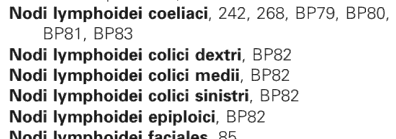Where is the correct position for the Latin words for left and right for a muscle or bone name and is there a general rule where to position this word?
In modern (English) usage, the Latin for left and right is not commonly used. Nevertheless, I think we can deduce a general rule by (1) looking at early anatomy books and (2) extrapolating from the use of other adjectives in anatomical works, both early and modern.
Thus, in Vesalius (1514-1564), we see the following examples:
ramus dexter and ramus sinister [masc. sing. nom.]
vena gastroomentalis dextra and vena gastroomentalis sinistra [fem. sing. nom.]
ostium atrioventriculare dextrum [neut. sing. nom]
From this, I think we can deduce that (a) the case, number, and gender of dexter and sinister agrees with the anatomical part under consideration (in these examples, ramus, vena, and ostium respectively); (b) the case is always in the nominative; and (c) dexter and sinister comes at the end.
If we look at other adjectives, we can see the same pattern. Again, in Vesalius:
vena mesenterica superior and vena mesenterica inferior
venae gastricae breves
aorta carotis interna
References to muscles follow the same pattern; for example:
musculus flexor pollicis brevis and musculus abductor pollicis longus
This pattern is still used in modern editions of anatomy books (I have used Moore & Dalley, 4th ed., Clinically Oriented Anatomy and Williams, Warwick, Dyson & Bannister, Gray's Anatomy, 37th ed.):
abductor pollicis longus and extensor pollicis brevis
gluteus medius
obturator internus
adductor magnus
So far, we can see a pattern like this:
a muscle/vein/bone etc. in the nominative case
plus the part of the body to which it belongs (typically in the genitive)
plus an adjective describing its location/position, especially when relative to another similar structure and/or an imagined mid-line of
the body (inferior and superior; internal and external; right and
left), in the nominative case, agreeing with the first part
Your particular question contains a superlative (latissimus) which none of my examples include. However, I think we can make a case for it to stay with musculus as it describes the muscle, rather than locates it, in the same way abductor or flexor does in the examples above. Thus, I would write:
musculus latissimus dorsi sinister
"the widest muscle [masc. sing. nom.] of the back [gen.] left side
[specifying location, masc. sing. nom. agreeing with musculus
latissimus "
ADDIT: if you have more than one adjective giving location, it seems both should go at the end but dexter and sinister still always seem to be last, as in the following examples (from Vesalius):
arteria carotis interna dextra
nervus laryngeus recurrens dexter
